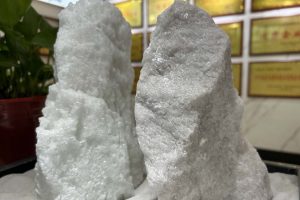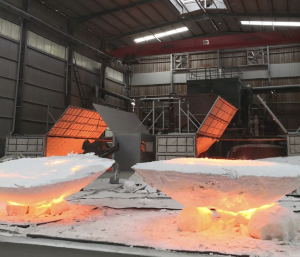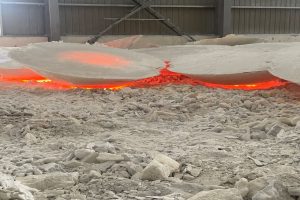Home / News & Blog / Abrasive Blog / Top Insights Into White-Fused Alumina Manufacturers
White-fused alumina (WFA) is a critical material widely used across industries due to its exceptional hardness, chemical stability, and thermal resistance. This versatile material finds applications in abrasives, refractories, and advanced ceramics, making it a cornerstone of modern manufacturing processes. Understanding the landscape of white-fused alumina manufacturers is essential for businesses looking to source high-quality materials. In this article, we delve into the production process, major global manufacturers, and the key factors to consider when selecting a supplier.

White-fused alumina is a synthetic material derived from calcined alumina. It is characterized by high purity, extreme hardness, and excellent thermal and chemical stability, making it indispensable for various high-performance applications.
Calcination: The process begins with the calcination of bauxite to remove moisture and impurities, resulting in alumina.
Electric Arc Furnace Melting: The calcined alumina is melted in an electric arc furnace at temperatures exceeding 2,000°C. This process forms the crystalline structure of white-fused alumina.
Crushing and Grading: Once cooled, the material is crushed, sieved, and graded into different sizes to meet diverse industrial requirements.


High Hardness: Ideal for abrasive applications.
Thermal Stability: Suitable for high-temperature environments.
Chemical Resistance: Performs well in corrosive settings.
White-fused alumina plays a crucial role in various industries, including:
Abrasives: Essential for manufacturing grinding wheels, sandpaper, and blasting media due to their hardness and durability.
Refractories: Used in high-temperature furnace linings and kiln furniture to withstand extreme heat and thermal shock.
Ceramics: Used in advanced engineering ceramics for electronics, automotive, and aerospace applications.
Emerging Applications: Increasingly used in renewable energy, such as solar panels, and advanced technologies requiring high-purity materials.
White-fused alumina is produced globally, with major manufacturing hubs in Asia, Europe, and North America. The choice of location significantly influences production costs, quality, and supply chain dynamics.
Asia: China and India dominate the market with large-scale production facilities. Their competitive pricing and extensive supply networks make them global leaders.
Europe: Countries like Germany and France are known for producing high-quality WFA, often catering to specialized industrial needs.
North America: The USA and Canada focus on producing premium-grade WFA for advanced applications.
Established:
Core Products: White fused alumina, brown fused alumina, and garnet abrasives.
Production Capacity:40,000 tons annually.
Export Markets: North America, Europe, and Southeast Asia.
Business Advantages: With over 20 years of experience, Haixu is known for its high-purity abrasives and customized grain sizes tailored to client needs.
Established:
Core Products: White fused alumina, ceramic alumina, and fused zirconia.
Production Capacity:60,000 tons annually.
Export Markets: Europe, the Americas, and Japan.
Business Advantages: Ruishi is recognized for its eco-friendly production techniques and advanced quality control processes.
Established:
Core Products: High-purity white fused alumina, silicon carbide, and polishing abrasives.
Production Capacity: 35,000 tons per year.
Export Markets: Southeast Asia, Europe, and South America.
Business Advantages: Junda offers precision-focused abrasive solutions with a strong emphasis on consistent quality.
Established:
Core Products: White fused alumina and brown fused alumina for sandblasting and grinding wheels.
Production Capacity:25,000 tons annually.
Export Markets: Middle East, Africa, and Europe.
Business Advantages: Known for its affordability and reliable delivery schedules.
Established:
Core Products: White fused alumina, pink fused alumina, and high-temperature refractories.
Production Capacity: 50,000 tons annually.
Export Markets: North America, Europe, and Asia-Pacific.
Business Advantages: Zhongsen is a trusted name for high-temperature-resistant abrasives and refractory materials.
Established:
Core Products: White fused alumina, coated abrasives, and polishing compounds.
Production Capacity: 40,000 tons annually.
Export Markets: Major clients in Europe, Australia, and the Americas.
Business Advantages: Yicheng’s strong focus on R&D ensures innovative products that meet evolving market needs.
Established:
Core Products: White fused alumina, vitrified grinding wheels, and polishing stones.
Production Capacity: 30,000 tons annually.
Export Markets: Europe, South Asia, and North America.
Business Advantages: Kaifeng excels in producing abrasives tailored for precision applications.
Established:
Core Products: White fused alumina, ceramic abrasives, and polishing powders.
Production Capacity: 28,000 tons annually.
Export Markets: Key markets in Asia-Pacific and South America.
Business Advantages: Bosheng’s abrasives are known for their durability and consistent quality, catering to high-demand industries.
Established:
Core Products: White fused alumina, garnet abrasives, and high-density fused alumina.
Production Capacity: 35,000 tons annually.
Export Markets: North America and Europe.
Business Advantages: Luba provides cost-effective solutions without compromising on product performance.
Established:
Core Products: White fused alumina, silicon carbide, and brown fused alumina.
Production Capacity:32,000 tons annually.
Export Markets: Europe, the Middle East, and Southeast Asia.
Business Advantages: Kaixin’s advanced manufacturing techniques ensure consistent quality and reliable performance.
Selecting the right white-fused alumina manufacturer requires careful evaluation of several factors:
Quality Assurance: Look for certifications like ISO to ensure consistent product quality.
Customization Capabilities: Ensure the manufacturer can tailor products to meet specific industrial needs.
Pricing and Value-Added Services: Compare costs while considering additional services such as technical support and logistics.
Supply Chain Reliability: Assess the manufacturer’s ability to meet delivery timelines and maintain supply consistency.
Building long-term partnerships with reliable manufacturers is crucial for securing a steady supply of high-quality WFA.
Environmental Regulations: Stricter laws on emissions and waste management increase production costs.
Raw Material Availability: Dependence on bauxite and energy-intensive processes creates vulnerabilities.
Price Fluctuations: Volatility in raw material and energy prices can impact manufacturing costs.
Rising Demand: Growth in renewable energy and advanced technologies drives the need for high-purity WFA.
Geographical Expansion: Manufacturers can tap into emerging markets with increasing industrialization.
White-fused alumina is a vital material for industries ranging from abrasives to advanced ceramics. Understanding the manufacturing landscape is key to selecting reliable suppliers that offer high-quality, cost-effective solutions. As the industry evolves, focusing on sustainability and innovation will be critical for manufacturers to meet the growing global demand.